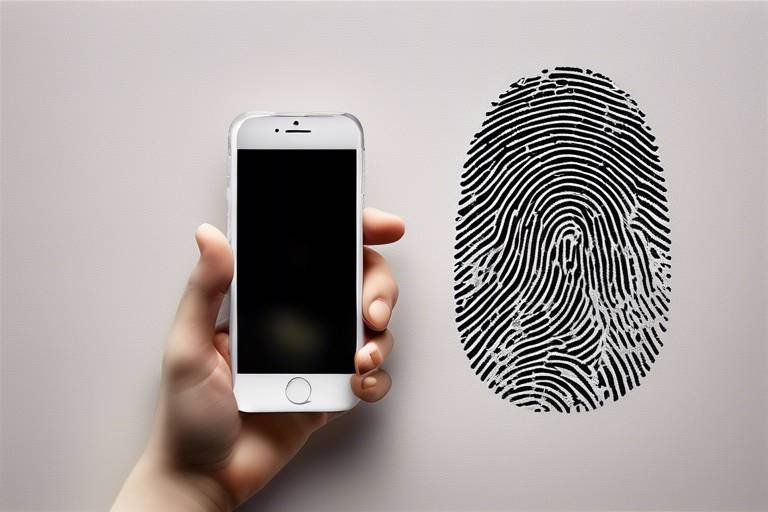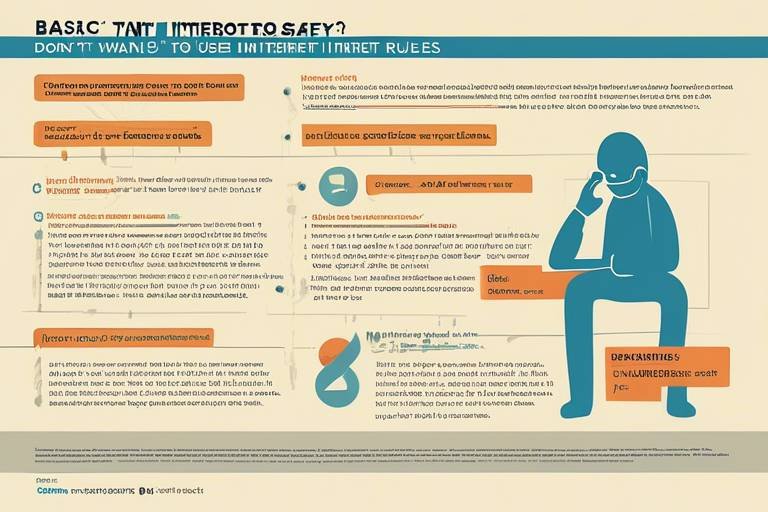Red Flags for Personal Safety
In today's world, where personal safety is of utmost importance, recognizing the warning signs that could indicate potential threats can be a game changer. Whether you're navigating personal relationships or simply moving through public spaces, being aware of red flags can help you protect yourself from harm. It's not just about being vigilant; it's about understanding what to look for and how to respond effectively. This article will delve into various red flags that can signal danger, equipping you with the knowledge you need to stay safe.
Personal safety encompasses a range of measures and awareness that are necessary to protect oneself from harm. It's like having a mental toolkit at your disposal, ready to be used whenever you sense something isn't right. Recognizing the importance of personal safety is the first step in identifying red flags in various situations. By staying informed and aware, you can create a safer environment for yourself and those around you.
When it comes to personal relationships, certain behaviors can act as warning signs that indicate potential danger. Understanding these red flags can empower individuals to make informed decisions about their interactions and relationships. It's crucial to keep an eye out for these signals, as they often serve as precursors to more serious issues down the line.
One of the most telling red flags is controlling behavior, which often manifests as jealousy or possessiveness. Imagine being in a relationship where your partner constantly questions your whereabouts or gets upset over harmless interactions with friends. Recognizing this early can prevent deeper issues from developing in a relationship, safeguarding your emotional well-being. The key is to be aware of how these behaviors make you feel. If you find yourself feeling restricted or anxious, it might be time to reassess the relationship.
Another significant red flag is isolation from friends and family. If your partner seems to want to limit your social interactions, it could indicate a desire to control your life. This behavior can creep in subtly, often disguised as concern for your well-being. Awareness of this behavior is essential for maintaining healthy relationships. Remember, a supportive partner encourages you to maintain your friendships, not to cut them off.
Frequent criticism can erode self-esteem and signal a toxic dynamic. If you find yourself constantly walking on eggshells, worried about how your actions will be perceived, it may be a sign of an unhealthy relationship. Identifying this behavior can empower you to address or exit unhealthy relationships. It's important to remember that constructive feedback is different from destructive criticism; the former helps you grow, while the latter diminishes your self-worth.
Inconsistent or evasive communication can indicate dishonesty or hidden agendas. If someone frequently changes their story or avoids answering direct questions, it’s a red flag that shouldn't be ignored. Being aware of these patterns is crucial for assessing the trustworthiness of individuals in your life. Trust your gut—if something feels off, it probably is.
Public spaces can also present potential threats, and understanding the signs of danger in these environments can enhance personal safety and awareness. It's important to stay alert and recognize behaviors that may signal danger, especially when you're out and about.
Observing unusual or erratic behavior in strangers can be a warning sign. For instance, if someone seems overly fixated on you or is acting in a way that makes you uncomfortable, it's essential to stay vigilant. Staying alert and recognizing these behaviors can help you avoid potentially dangerous situations. Trust your instincts; they often know when something feels off.
When someone disregards personal space or boundaries, it can indicate a lack of respect or awareness. Recognizing this behavior is vital for personal safety in public interactions. If someone is invading your personal space and making you feel uncomfortable, it's okay to assert your boundaries. Your comfort and safety should always come first.
Intuition plays a critical role in personal safety. Learning to trust your instincts can help you recognize red flags and take appropriate actions to protect yourself. Often, our gut feelings can alert us to danger before our rational minds catch up. So the next time you feel something isn’t right, pay attention to that inner voice.
Recognizing red flags is only the first step; knowing how to respond is equally important. Here are some practical steps to take when encountering warning signs in various scenarios:
- Trust Your Gut: If something feels off, don’t dismiss it.
- Document Behaviors: Keep a record of concerning behaviors to identify patterns.
- Seek Support: Talk to friends or family about your concerns.
- Establish Boundaries: Clearly communicate your limits with others.
- Know When to Walk Away: If a situation feels unsafe, prioritize your safety and exit.
What should I do if I notice red flags in a relationship?
It's important to address your concerns directly with your partner. Open communication can sometimes resolve misunderstandings. If the behavior continues, consider seeking support from friends or professionals.
How can I improve my personal safety in public spaces?
Stay aware of your surroundings, trust your instincts, and don't hesitate to remove yourself from uncomfortable situations. Consider taking self-defense classes for added confidence.
Is it normal to feel anxious about personal safety?
Feeling anxious about personal safety is common, especially in today's world. Acknowledging these feelings and taking proactive steps can help you feel more secure.

Understanding Personal Safety
Personal safety is more than just a buzzword; it’s a vital aspect of our daily lives that often goes unnoticed until we find ourselves in a precarious situation. Think of it as the invisible shield that protects us from harm, both physical and emotional. Understanding personal safety involves being aware of our surroundings, recognizing potential threats, and taking proactive measures to safeguard ourselves. It’s like having a sixth sense that alerts us when something feels off. Have you ever walked into a room and felt an inexplicable chill? That’s your intuition kicking in, urging you to pay attention.
To truly grasp the concept of personal safety, one must first acknowledge its importance. It’s not just about avoiding dangerous neighborhoods or being cautious at night; it encompasses every interaction we have, whether with friends, family, or strangers. Personal safety is about setting boundaries, respecting oneself, and recognizing when those boundaries are being crossed. For instance, if a friend constantly belittles your achievements, that can be a subtle form of emotional harm. It’s crucial to be aware of these dynamics and understand that safeguarding your mental health is just as important as physical safety.
Moreover, personal safety is a multifaceted concept that requires continuous vigilance. It’s about developing a keen sense of awareness and understanding the various environments we navigate daily. Here are some key components to consider:
- Awareness: Being alert to your surroundings and recognizing when something feels off.
- Communication: Being able to express your feelings and boundaries clearly to others.
- Trusting Your Instincts: Listening to that gut feeling when something doesn’t seem right.
- Preparation: Having a plan in place for emergencies or uncomfortable situations.
In essence, personal safety is about empowerment. It’s about equipping yourself with the knowledge and skills to navigate life’s challenges confidently. By understanding the importance of personal safety, you can better identify red flags in various situations and take appropriate actions to protect yourself. So, the next time you feel uneasy in a situation, remember that it’s okay to trust those feelings. Just like a lighthouse guiding ships safely to shore, your instincts can lead you away from potential danger.

Common Red Flags in Relationships
In personal relationships, being aware of certain warning signs can be a game changer. These red flags often serve as indicators that something may not be right, allowing you to make informed decisions about your interactions. After all, relationships should be a source of joy and support, not a cause for anxiety or distress. But how do you identify these red flags? Let’s delve into some common behaviors that might signal potential danger in a relationship.
One of the most telling signs of a problematic relationship is controlling behavior. This often manifests as jealousy or possessiveness, where one partner may attempt to dictate how the other should act, who they should spend time with, or even what they should wear. It’s important to recognize these patterns early on, as they can escalate into more serious issues. For instance, a partner who frequently questions your whereabouts or becomes upset when you spend time with friends might be exhibiting controlling tendencies. This kind of behavior can chip away at your emotional well-being, making you feel trapped and anxious.
Another significant red flag is isolation. If you notice that your partner is trying to distance you from your friends or family, it’s a cause for concern. Isolation can be subtle at first; perhaps they express disapproval of your friends or make excuses for why you shouldn’t hang out with them. Over time, this can lead to a complete severance from your support network, leaving you vulnerable and dependent on your partner. Maintaining connections with loved ones is crucial for a healthy relationship, so be vigilant if you sense any attempts to isolate you.
Frequent criticism is yet another red flag that can indicate a toxic dynamic. If your partner constantly points out your flaws or belittles your achievements, it can erode your self-esteem and lead to feelings of inadequacy. It’s easy to dismiss occasional criticism as a part of any relationship, but when it becomes a pattern, it’s essential to take a step back and evaluate the situation. Remember, a supportive partner should uplift you, not tear you down.
Inconsistent or evasive communication can also be a significant warning sign. If your partner often avoids discussing important topics or gives vague answers to straightforward questions, it might indicate dishonesty or hidden agendas. Trust is the foundation of any healthy relationship, so being aware of these communication patterns is crucial. Ask yourself: Are you getting the clarity you need? Are your concerns being addressed? If not, it may be time to reassess the relationship.
Recognizing these red flags is vital for your emotional health and well-being. Relationships should foster growth, love, and support. If you find yourself in a situation where these behaviors are present, it’s important to take action. Whether that means having an open conversation with your partner or considering whether the relationship is right for you, prioritizing your safety and happiness should always come first.
- What should I do if I notice red flags in my relationship? It's essential to communicate your concerns with your partner openly. If the behavior continues, consider seeking professional guidance or reevaluating the relationship.
- Are red flags always a sign to end a relationship? Not necessarily. Some behaviors can be addressed through honest communication and effort from both partners. However, if the red flags persist and cause harm, it may be time to reconsider the relationship.
- How can I protect myself from potential harmful relationships? Trust your instincts, maintain connections with friends and family, and prioritize your emotional well-being. Awareness of red flags is key to ensuring your safety.

Controlling Behavior
is often a subtle yet alarming indicator of potential emotional abuse in a relationship. It typically manifests through jealousy or possessiveness, where one partner seeks to dominate the other's actions, thoughts, and even relationships. You might notice your partner questioning your whereabouts or expressing discomfort when you spend time with friends or family. This kind of behavior can feel flattering at first, as it may seem like they care deeply about you. However, it's crucial to recognize that this is not love; it's a warning sign that should not be ignored.
Imagine being in a relationship where your partner constantly checks your phone or insists on knowing every detail of your day. At first, you might brush it off as concern, but over time, this kind of scrutiny can chip away at your self-esteem and independence. It's like a slow leak in a tire—you might not notice it at first, but eventually, it can lead to a complete blowout. Understanding the implications of controlling behavior is essential for maintaining your emotional well-being.
One of the most significant aspects of controlling behavior is its impact on social isolation. When a partner tries to limit your interactions with friends and family, it can create a toxic environment. You might find yourself spending more time with your partner and less with your loved ones, leading to feelings of loneliness and despair. This isolation is a red flag that should raise alarms. Here are some signs to watch out for:
- Your partner discourages you from seeing friends or family.
- They frequently express jealousy over your social interactions.
- They attempt to control who you can or cannot talk to.
It's vital to recognize these behaviors early on. If you find yourself in a situation where you feel like your freedom is being restricted, consider talking to someone you trust about your experiences. Remember, a healthy relationship should encourage personal growth and social interactions, not stifle them.
Additionally, excessive criticism often accompanies controlling behavior. If your partner constantly puts you down or belittles your achievements, it can create a toxic dynamic that erodes your self-esteem. You might start to doubt your worth and feel trapped in a cycle of negativity. This is not normal and should not be tolerated. Empowering yourself by recognizing these patterns can help you take the necessary steps to address the issue or even exit the relationship if needed.
In conclusion, being aware of controlling behavior is crucial for your emotional health. It may not always be easy to spot, especially when it is wrapped in the guise of love and concern. However, by paying attention to red flags and trusting your instincts, you can safeguard your personal well-being and maintain healthy, balanced relationships.
Q: What should I do if I notice controlling behavior in my relationship?
A: It's essential to communicate your feelings to your partner. If they are unwilling to change, consider seeking support from friends, family, or a professional.
Q: How can I differentiate between caring and controlling behavior?
A: Caring behavior respects your independence and encourages your personal growth, while controlling behavior seeks to limit your actions and isolate you from others.
Q: Is it possible for someone to change their controlling behavior?
A: Change is possible, but it requires self-awareness and a willingness to seek help. If your partner is open to therapy or counseling, it may help address these issues.

Isolation from Friends
Isolation from friends is one of the most telling red flags in a relationship, and it often goes unnoticed until it’s too late. When a partner actively discourages you from spending time with your friends or family, it raises a significant alarm. Initially, it might seem like they just want to spend quality time with you, but this behavior can quickly morph into a controlling dynamic. It's essential to recognize that healthy relationships thrive on trust and independence. If your partner is attempting to limit your social interactions, they may be trying to exert control over your life.
Consider this: friendships are like the roots of a tree, providing nourishment and stability. When those roots are cut off, the tree struggles to survive. Similarly, when someone isolates you from your support network, they are weakening your emotional and social foundation. Isolation can manifest in various ways, such as:
- Subtle Manipulation: Your partner might make you feel guilty for wanting to hang out with friends, implying that you don’t value your relationship.
- Direct Interference: They may outright refuse to let you go out with friends or create situations that make it difficult for you to maintain those connections.
- Creating Conflict: Your partner could provoke arguments whenever you mention social plans, making you feel that staying home is the easier option.
It’s important to ask yourself, “Why is this happening?” If you find yourself frequently choosing to stay in rather than see your friends, it might be time for some self-reflection. Are you genuinely happy in this relationship, or are you feeling pressured to conform to your partner’s wishes? Recognizing these patterns early can be crucial in maintaining your autonomy and mental health.
Moreover, isolation can lead to feelings of loneliness and depression, which can further exacerbate the situation. If you notice that your social circle is shrinking, it’s essential to reach out to those friends and family members. They can provide a much-needed perspective and support. Remember, it’s okay to seek help. Talking to someone about your experiences can illuminate the path forward and help you regain your sense of self.
In conclusion, being isolated from friends is not just a minor issue; it’s a significant red flag that should not be ignored. The sooner you recognize and address this behavior, the better your chances of maintaining healthy relationships in the future. Always prioritize your well-being and remember that a supportive partner will encourage you to nurture your friendships rather than stifle them.
- What should I do if I notice isolation from friends? It’s crucial to communicate openly with your partner about your feelings and the importance of maintaining friendships. If the behavior continues, consider seeking support from trusted friends or a professional.
- How can I identify if I am being isolated? Look for patterns where your partner discourages social interaction, makes you feel guilty about spending time away from them, or creates conflict when you mention plans with friends.
- Is it normal for partners to want to spend time together? Yes, wanting to spend time together is normal, but it should never come at the expense of your friendships or personal freedom.

Excessive Criticism
Excessive criticism in a relationship can be a subtle yet powerful red flag that often goes unnoticed until it has deeply affected one’s self-esteem and emotional health. Imagine being in a partnership where every little thing you do is scrutinized; it feels like walking on eggshells, doesn’t it? This kind of environment can lead to a toxic dynamic where one partner feels constantly belittled and undervalued. The impact of such behavior can be profound, often leading to feelings of inadequacy and self-doubt.
At its core, excessive criticism is not just about pointing out flaws; it’s about creating a narrative that suggests you are never good enough. This might manifest in various ways, such as:
- Frequent Negative Feedback: If your partner consistently finds fault in your actions, decisions, or appearance, it can chip away at your confidence.
- Comparisons to Others: Being compared unfavorably to friends, family, or even strangers can make you feel like you’re always falling short.
- Dismissive Attitude: When your achievements or efforts are downplayed or ignored, it sends a message that your worth is tied to your partner's approval.
Recognizing these patterns early on is crucial. If you find yourself in a situation where you’re receiving more criticism than praise, it’s essential to take a step back and evaluate the relationship. Ask yourself: Is this behavior a one-time occurrence, or is it a recurring theme? If it’s the latter, it may be time to address the issue directly with your partner or consider the implications for your emotional well-being.
Moreover, it’s important to differentiate between constructive criticism and excessive criticism. Constructive feedback aims to help you grow and improve, delivered in a supportive manner. In contrast, excessive criticism often feels like an attack, leaving you feeling demoralized rather than empowered. It’s vital to foster relationships where open communication thrives and where both partners feel valued and respected.
In summary, if you find that excessive criticism is a frequent visitor in your relationship, don’t ignore it. Acknowledge it, address it, and seek to understand the underlying motivations behind such behavior. Remember, you deserve to be in a relationship that uplifts and supports you, not one that constantly diminishes your worth.
- What should I do if I notice excessive criticism in my relationship?
It’s important to address the issue directly with your partner. Open communication can help clarify intentions and foster understanding. - How can I differentiate between constructive criticism and excessive criticism?
Constructive criticism is aimed at helping you improve, while excessive criticism often feels like an attack on your character or worth. - What are the long-term effects of excessive criticism?
Long-term exposure to excessive criticism can lead to low self-esteem, anxiety, and even depression. It’s crucial to recognize and address it early.

Inconsistent Communication
In the intricate web of human interactions, communication serves as the thread that binds relationships together. When this thread becomes frayed or inconsistent, it can raise significant red flags. Have you ever found yourself in a conversation where the other person seems to dodge questions or provide vague answers? This behavior can be a glaring indicator of deeper issues, such as dishonesty or a hidden agenda. It's like trying to catch smoke with your bare hands; the more you reach out, the more elusive it becomes. Recognizing these patterns early can save you from potential heartache and confusion down the line.
Inconsistent communication can manifest in various ways. For instance, you might notice that someone frequently changes their story or offers conflicting information about their whereabouts or plans. This inconsistency can create an unsettling atmosphere, leaving you questioning their sincerity. You might find yourself asking:
- Why did they say one thing yesterday and something completely different today?
- Are they trying to hide something from me?
- How can I trust someone who can’t keep their story straight?
These questions are not just passing thoughts; they are vital signals to pay attention to. A relationship built on trust should feel secure, not like walking on a tightrope. If you find that the person you’re communicating with consistently leaves you feeling uncertain or anxious, it’s time to take a step back. Consider keeping a mental note of these communication patterns. You could even create a simple table to track your observations:
| Date | What Was Said | Follow-Up Questions |
|---|---|---|
| MM/DD/YYYY | Example statement or response | Questions that arose from the conversation |
| MM/DD/YYYY | Example statement or response | Questions that arose from the conversation |
By keeping track of these inconsistencies, you empower yourself to make informed decisions about the relationship. Remember, your feelings are valid. If something feels off, it probably is. Trust your gut. It’s your internal alarm system, designed to protect you from potential harm.
Ultimately, consistent communication is the foundation of any healthy relationship. If you find yourself in a situation where the communication is erratic, it may be time to reassess the dynamics at play. Are you willing to engage in a relationship where you constantly question the other person’s honesty? Life is too short to be caught in a web of confusion and doubt. Embrace clarity and surround yourself with those who value transparency as much as you do.
- What should I do if I notice inconsistent communication? - Trust your instincts. Document your observations and consider discussing your concerns with the person involved.
- Can inconsistent communication be a sign of something serious? - Yes, it can indicate deeper issues such as dishonesty or emotional unavailability.
- How can I improve communication in my relationships? - Foster an environment of openness and honesty. Encourage direct conversations where both parties feel safe to express their thoughts.

Recognizing Red Flags in Public Spaces
When we step out into the world, whether it's for a quick coffee run or a leisurely stroll in the park, our personal safety should always be a top priority. Public spaces can sometimes feel like a safe haven, but they can also harbor potential threats. It's essential to stay vigilant and recognize the signs that something might be off. But how do you identify these red flags? Let's dive into some key indicators that can help you stay safe.
First and foremost, unusual behavior from strangers should raise your eyebrows. This could be anything from someone acting overly aggressive or erratic to someone who seems overly interested in you without a clear reason. For instance, if you notice a person pacing back and forth, talking to themselves, or exhibiting signs of distress, it's wise to keep your distance. Your gut feeling is often your best ally in these situations. If something feels off, it probably is.
Another crucial red flag to be aware of is ignoring personal boundaries. Personal space is a fundamental aspect of our interactions, and when someone disregards it, it can signal a lack of respect or awareness. If someone is invading your personal space, it may not just be an innocent mistake; it could indicate a more sinister intention. For example, if a stranger stands too close to you in line or follows you too closely while walking, it's time to reassess the situation. Remember, you have every right to assert your boundaries and step away from uncomfortable encounters.
Moreover, trust your instincts when something feels wrong. If you sense that you are being watched or followed, don't hesitate to act. You can take various steps to protect yourself, such as:
- Changing your route or heading into a nearby store or public place.
- Informing a friend or family member about your situation.
- Contacting local authorities if you feel threatened.
In addition to these behaviors, be mindful of your surroundings. Are there groups of people loitering without any clear purpose? Are individuals engaging in suspicious activities, such as looking over their shoulders frequently or acting overly secretive? These can all be signs of potential danger. Staying alert can help you avoid becoming a target.
Lastly, it's essential to remember that recognizing red flags isn't just about avoiding danger; it's also about fostering a sense of community. By being aware of your surroundings and the behaviors of those around you, you contribute to a safer environment for everyone. If you notice someone else in distress or a potentially dangerous situation, don't hesitate to intervene or seek help. After all, safety is a shared responsibility.
Q: What should I do if I feel uncomfortable in a public space?
A: Trust your instincts. If you feel uncomfortable, it's best to remove yourself from the situation. You can change your route, enter a nearby store, or contact someone for support.
Q: How can I improve my awareness in public spaces?
A: Practice being mindful of your surroundings. Regularly scan the area for unusual behavior and keep your phone away to minimize distractions.
Q: Are there specific behaviors that indicate someone is a threat?
A: Yes, signs such as erratic movements, ignoring personal boundaries, or acting overly aggressive can indicate potential threats. Always trust your gut feelings in these situations.

Unusual Behavior from Strangers
When it comes to personal safety, one of the most critical aspects is being aware of your surroundings, especially in public spaces. can serve as a significant red flag, alerting you to potential danger. But what exactly constitutes "unusual behavior"? It could range from someone acting erratically to a person who seems overly interested in your actions. The key is to stay vigilant and trust your instincts.
Imagine you’re at a coffee shop, enjoying your favorite latte, when suddenly, you notice someone sitting too close for comfort, staring at you intently. This could be a sign that something isn't quite right. It's essential to recognize these behaviors early to avoid potentially harmful situations. Here are some examples of unusual behaviors to watch out for:
- Erratic Movements: Someone who is fidgeting excessively, pacing back and forth, or making sudden, unpredictable movements may be exhibiting signs of distress or agitation.
- Overly Intense Staring: If a stranger is fixated on you for an extended period, it can feel uncomfortable and threatening. This behavior often indicates a lack of social awareness.
- Inappropriate Comments: If someone approaches you with unsolicited remarks that are too personal or intrusive, it’s a significant red flag.
- Following You: If you notice someone consistently in your vicinity, even after changing your location, this could indicate a dangerous intent.
Being aware of these signs is just the first step; knowing how to react is equally important. If you feel uneasy, consider moving to a more crowded area or seeking assistance from a nearby store employee or security personnel. Your safety should always take precedence, and it’s perfectly okay to remove yourself from a situation that feels off.
Additionally, remember that your intuition is a powerful tool. If something feels wrong, it probably is. Trusting your gut can be the difference between a safe experience and a potentially dangerous encounter. In such moments, it’s crucial to stay calm, assess the situation, and take appropriate action.
As you navigate public spaces, keep your phone handy and ensure it’s charged. In case of an emergency, you may need to call for help quickly. Familiarize yourself with the layout of the location you’re in, so you can identify exits or safe areas if needed. Ultimately, your awareness and preparedness can significantly enhance your personal safety.
Q: What should I do if I encounter someone displaying unusual behavior?
A: Trust your instincts. If you feel uncomfortable, it’s best to remove yourself from the situation. Seek help from nearby staff or call for assistance if necessary.
Q: How can I improve my awareness in public spaces?
A: Practice being observant. Regularly scan your surroundings, notice the people around you, and be aware of any changes in behavior that seem out of the ordinary.
Q: Is it appropriate to confront someone displaying unusual behavior?
A: It’s generally safer to avoid confrontation. Instead, focus on getting to a safe place and reporting the behavior to authorities if needed.

Ignoring Personal Boundaries
When it comes to personal safety, one of the most crucial aspects to consider is the concept of personal boundaries. These boundaries are the invisible lines that define where your comfort zone lies, and they vary from person to person. When someone consistently ignores these boundaries, it can be a serious red flag. Imagine you're at a party, and someone keeps inching closer to you, invading your personal space despite your evident discomfort. This behavior is not just annoying; it's a clear sign of disrespect and a potential threat to your safety.
Ignoring personal boundaries can manifest in various ways. It might involve someone physically getting too close without your consent, or it could be more subtle, like constantly interrupting you or disregarding your opinions. In both cases, the underlying message is the same: your comfort and autonomy are not valued. This lack of respect can lead to more serious issues, including emotional manipulation or even physical threats. It's essential to recognize these signs early on to protect yourself from potentially harmful situations.
To better understand the implications of ignoring personal boundaries, consider the following examples:
- Physical Space: If someone stands too close for comfort or touches you without consent, it can be a sign of boundary violation.
- Emotional Space: When someone dismisses your feelings or opinions, it indicates a lack of respect for your emotional boundaries.
- Digital Boundaries: Constantly messaging or calling without considering your availability can also be a red flag.
Recognizing these behaviors is the first step towards asserting your boundaries and ensuring your safety. When someone ignores your personal boundaries, it's crucial to communicate your discomfort clearly. You might say something like, "I need a little more space, please," or "I prefer to keep our conversations to a minimum." Setting these boundaries not only protects you but also sends a clear message that you value your personal space and expect others to do the same.
In a world where personal interactions are frequent, being aware of how others respect your boundaries can significantly impact your overall safety. Remember, it's not just about your physical space; it's about your emotional and psychological well-being as well. If someone continuously disregards your boundaries despite your requests, it may be time to reevaluate that relationship. Trust your instincts; if something feels off, it probably is.
- What should I do if someone ignores my personal boundaries?
It's essential to communicate your feelings clearly and assertively. If the behavior continues, consider distancing yourself from that person. - How can I establish my personal boundaries?
Start by identifying what makes you uncomfortable and communicate those boundaries to others. Be consistent in enforcing them. - Are personal boundaries the same for everyone?
No, personal boundaries vary from person to person based on individual comfort levels and experiences. - What are some signs that my boundaries are being violated?
Signs include feeling uncomfortable, anxious, or disrespected in someone’s presence or feeling pressured to act against your will.

Trusting Your Instincts
When it comes to personal safety, can be your best ally. Have you ever walked into a room and felt an immediate sense of unease? That gut feeling is your intuition kicking in, alerting you to potential danger. It’s like having an internal alarm system that, when tuned in, can guide you away from risky situations. The challenge, however, lies in recognizing and acting on those instincts.
Many people have experienced moments where they ignored their gut feelings, only to regret it later. This is not uncommon; society often conditions us to dismiss our instincts as irrational or overly dramatic. But let’s face it—our instincts are shaped by experiences and observations throughout our lives. They are a culmination of our subconscious processing, constantly analyzing our environment and the people in it.
So, how can you sharpen this intuitive sense? Awareness is key. Start by paying attention to your feelings in different situations. Are there specific scenarios that trigger discomfort? Do certain people make you feel uneasy? Keeping a mental note can help you identify patterns. For instance, if you consistently feel uncomfortable around a particular friend or colleague, it's worth exploring why that is. Ask yourself: what specific behavior or situation is triggering this feeling?
Moreover, don't hesitate to validate your feelings. If something feels off, it probably is. You have every right to prioritize your safety and well-being. If you find yourself in a situation where your instincts are signaling danger, take a step back. Assess the environment, the people around you, and your own emotional response. Sometimes, simply removing yourself from the situation can be a powerful act of self-care.
Another important aspect of trusting your instincts is learning to communicate them effectively. If you feel uncomfortable in a social setting, don’t be afraid to voice your concerns. You might say something like, “I’m not feeling great about this situation; I think I’ll head out.” This not only empowers you but also sets a precedent for your own boundaries. Remember, it’s okay to prioritize your own feelings and safety over social expectations.
To further illustrate the importance of trusting your instincts, consider the following table that outlines common scenarios where intuition plays a crucial role:
| Scenario | Intuitive Response | Action to Take |
|---|---|---|
| Meeting someone new | Feeling uneasy or apprehensive | Engage cautiously, keep your distance |
| Walking alone at night | Feeling like you're being followed | Change your route, seek a public place |
| Hearing a loud argument | Feeling anxious or threatened | Leave the area, call for help if necessary |
In summary, trusting your instincts is not just about feeling; it's about listening and responding. It’s a skill that can be honed over time. The more you practice being aware of your feelings and acting on them, the more confident you will become in your ability to protect yourself. Remember, your instincts are there for a reason—don’t ignore them!
Q: How do I differentiate between intuition and anxiety?
A: Intuition often provides a calm, clear signal about a situation, while anxiety is usually accompanied by racing thoughts and overwhelming feelings. Take a moment to breathe and assess the situation to determine which is at play.
Q: What if my instincts are wrong?
A: It’s normal to question your instincts, but remember that they are based on your experiences. If you feel something is off, it’s always better to err on the side of caution.
Q: Can I train myself to be more intuitive?
A: Absolutely! Practice mindfulness, reflect on past experiences, and pay attention to your feelings in various situations to strengthen your intuitive abilities.

Taking Action on Red Flags
Recognizing red flags is just the beginning; knowing how to respond effectively is crucial for personal safety. When you identify a potential threat, whether it's in a relationship or a public space, taking swift and decisive action can make all the difference. It's like being a detective in your own life—gathering clues and piecing together the bigger picture. So, what should you do when you spot these warning signs?
First and foremost, trust your instincts. If something feels off, it probably is. Our intuition often picks up on subtle cues that our conscious mind might overlook. For example, if you feel uncomfortable around someone due to their behavior, don’t dismiss that feeling. Instead, consider it a signal to reassess the situation. You might say to yourself, “Why do I feel this way? What specific actions are causing this discomfort?” This self-reflection can help clarify your next steps.
Next, it's essential to communicate your concerns clearly and assertively. If you're in a relationship where you notice controlling behavior or excessive criticism, address it directly with your partner. Use “I” statements to express how their actions affect you. For instance, you could say, “I feel belittled when you criticize my choices in front of others.” This approach can open a dialogue and potentially lead to a healthier dynamic. However, if the behavior continues or escalates, it may be time to consider distancing yourself from the relationship.
In public spaces, maintaining awareness of your surroundings is vital. If you encounter someone exhibiting suspicious behavior, such as lingering too long in one spot or acting erratically, it’s wise to move to a more populated area. Trust your gut and don’t hesitate to seek help from others nearby if you feel threatened. Remember, there's strength in numbers, and having allies can deter potential threats.
Sometimes, taking action also means having a plan in place. Consider creating a personal safety strategy that outlines steps to take in various scenarios. This could include:
- Establishing a code word with friends or family that signals you need help.
- Identifying safe locations you can go to if you feel threatened.
- Keeping your phone charged and easily accessible for emergencies.
Additionally, don’t hesitate to report concerning behaviors to authorities when necessary. If someone is making you feel unsafe, whether in a personal or public context, it’s important to document the behavior and seek help. This could mean talking to a trusted friend, contacting security personnel, or even filing a report with local law enforcement. Remember, your safety is paramount, and taking action can prevent a situation from escalating.
Lastly, consider seeking professional help if you find yourself in a consistently toxic environment. Therapists and counselors can provide valuable insights and coping strategies that empower you to navigate difficult relationships and situations. They can help you understand the patterns you may be experiencing and guide you towards healthier interactions.
- What should I do if I notice red flags in my relationship?
It's important to communicate your feelings with your partner. If the behavior continues, consider seeking help or reevaluating the relationship. - How can I improve my awareness in public spaces?
Practice being mindful of your surroundings and trust your instincts. Avoid distractions like your phone when in unfamiliar areas. - Is it okay to report suspicious behavior?
Absolutely! If you feel threatened or see someone acting suspiciously, it’s better to be safe and report it to the authorities.
Frequently Asked Questions
- What are some common red flags to look for in relationships?
Common red flags include controlling behavior, excessive criticism, and isolation from friends. These behaviors can indicate a toxic dynamic and may signal potential danger in a relationship.
- How can I recognize unusual behavior in public spaces?
Unusual behavior might include someone acting erratically, invading personal space, or showing signs of aggression. Staying alert and aware of your surroundings can help you identify these warning signs.
- Why is trusting my instincts important for personal safety?
Your instincts are often your first line of defense. If something feels off, it probably is. Learning to trust your gut can help you recognize red flags and take action before a situation escalates.
- What should I do if I encounter a red flag?
If you notice a red flag, it's essential to assess the situation carefully. Depending on the context, you may want to address the behavior directly, seek support from friends or family, or remove yourself from the situation entirely.
- How can I maintain personal safety in public spaces?
To enhance your safety, stay aware of your surroundings, trust your instincts, and avoid distractions like your phone. Additionally, consider walking in well-lit areas and, if necessary, having a safety plan in place.



















